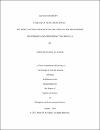THE EFFECT OF TREATED WASTE WATER (TWW) ON THE RHIZOSPHERE MICROBIOMES AND THEIR IMPACT ON ARUGULA
| Advisor | Goktepe, Ipek |
| Author | Al Naemi, Moza M. |
| Available date | 2017-03-06T07:13:29Z |
| Publication Date | 2016 |
| Abstract | Qatar needs to achieve water and food security in an arid climate and maintain its fossil-fuel energy exporting status. Treated wastewater (TWW) can be an alternative source for vegetable crops irrigation in Qatar; however, no studies have been undertaken in Qatar to study the effect of local TWW on vegetable irrigation and soil microbiome. Arugula (Eruca sativa) was chosen for this study due to its economic importance and profitability, fast maturation, and growing popularity as a salad green. A pinch of Arugula seeds were sprinkled uniformly in pots containing different soil mixtures (natural soil, peatmoss, sterilized peatmoss, and mixed soils), placed on counters inside of the Qatar University greenhouse at 25°C, with 10 hrs daylight, 14 hrs dark for 41 days. The plant samples were watered with either tap water (FW) or TWW throughout the study period. At days 0, 21, and 41, soil samples were analyzed for cations, anions, trace metals, total N, C, H, and S as well as for microbial growth. Arugula seeds failed to germinate in natural soil and mixed soils due to high salinity in natural soil, making it unsuitable for agricultural purposes. The Microfauna in both natural soil and peatmoss exhibited changes in structure and abundance after irrigation with either FW or TWW. Changes in structure and abundance were due to time of sampling, soil type, competition and interaction between the different microbiota naturally present in the soil. Results also showed a significant positive correlation in soil between aerobic mesophilic bacteria and plant growth (p=0.0255). The growth of Pseudomonas spp, the Streptococcus spp., and nitrogen-fixing bacteria was significantly (p≤0.05) different in soil samples treated with TWW compared to FW. Total coliform counts were not significantly impacted by soil type, water regimen, or time (p=0.0845). Further research should be undertaken to isolate and identify different species cultured and look into their activity to discern whether the TWW application improves the soil health by increasing the beneficial strains or increases the pathogenic ones. Microbial soil activity is another field that could also be investigated and its changes according to the irrigation method as another indicator of soil health. |
| Language | en |
| Subject | Arugula Microbiomes Rhizosphere Treated Waste Water Environmental science Soil sciences |
| Type | Master Thesis |
| Department | Biological & Environmental Sciences |
Files in this item
This item appears in the following Collection(s)
-
Biological & Environmental Sciences [89 items ]


